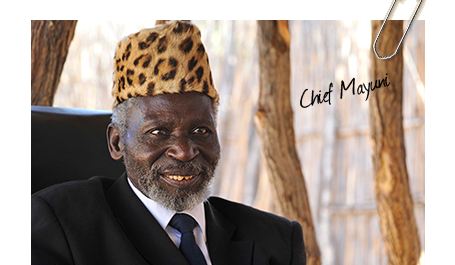Chief Mayuni talks about hunting
What does hunting mean for Namibia? According to Chief Mayuni, the patron of Mayuni Conservancy and the Chief of the Mafwe people, hunting is essential to conservation in Namibia.In an interview with Bennety Likulela of IRDNC, the Chief explains that hunting pays for conservation, and is carefully controlled according to quotas set by the Ministry of Environment and Tourism.
Every year, the Zambezi Region conservancies conduct a game count, covering hundreds of kilometres on foot. Tallying up the numbers of game and spoor spotted, an accurate assessment of the game in the area is made; and over the last two decades, the trend has been upwards: there is more game because the conservancy game guards are protecting it. Game guards are paid for from two revenue sources. Trophy hunting has been the main source of income, and remains the only source in conservancies without tourism potential. Income from lodges is the other principal source of revenue, and it is growing, thanks to the increase in wildlife.

- In 2013, Mayuni Conservancy earned US$ 30,453 (N$ 330,115) from trophy hunting.
- It earned a total of US$ 136,050
(N$ 1,474,786) from joint ventures that same year.
Income from hunting and tourism also pays for human-wildlife conflict mitigation measures. Chief Mayuni explains that farmers suffer severe losses from wildlife. Elephants trample crops, lions and other predators take cattle and small stock, and humans are killed every year by elephants, hippos and crocodiles. Measures such as chilli smoke bombs, lion proof kraals and crocodile fences all cost money, and are paid for largely from hunting revenue. Compensation is also paid to farmers who have suffered losses, and sadly to families who have lost loved ones.
The Chief is an ardent conservationist. He persuaded his people to move from the river side and make more space for wildlife. He believes that trophy hunting is an important conservation tool that is essential to sustain his people and wildlife populations. Without it, conservation would come to an end in the region.
Steve Felton
The Chief is an ardent conservationist. He persuaded his people to move from the river side and make more space for wildlife. He believes that trophy hunting is an important conservation tool that is essential to sustain his people and wildlife populations. Without it, conservation would come to an end in the region.
Steve Felton
IRDNC has provided support to Mayuni Conservancy since before its registration in 1999. Part of this technical support is to facilitate trophy hunting contracts and the management of these agreements.



